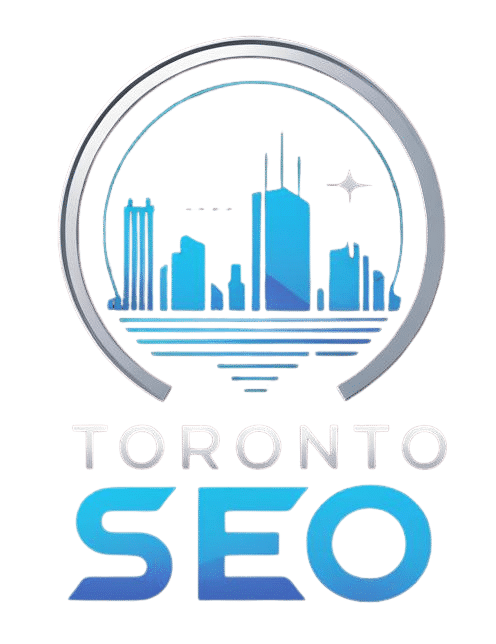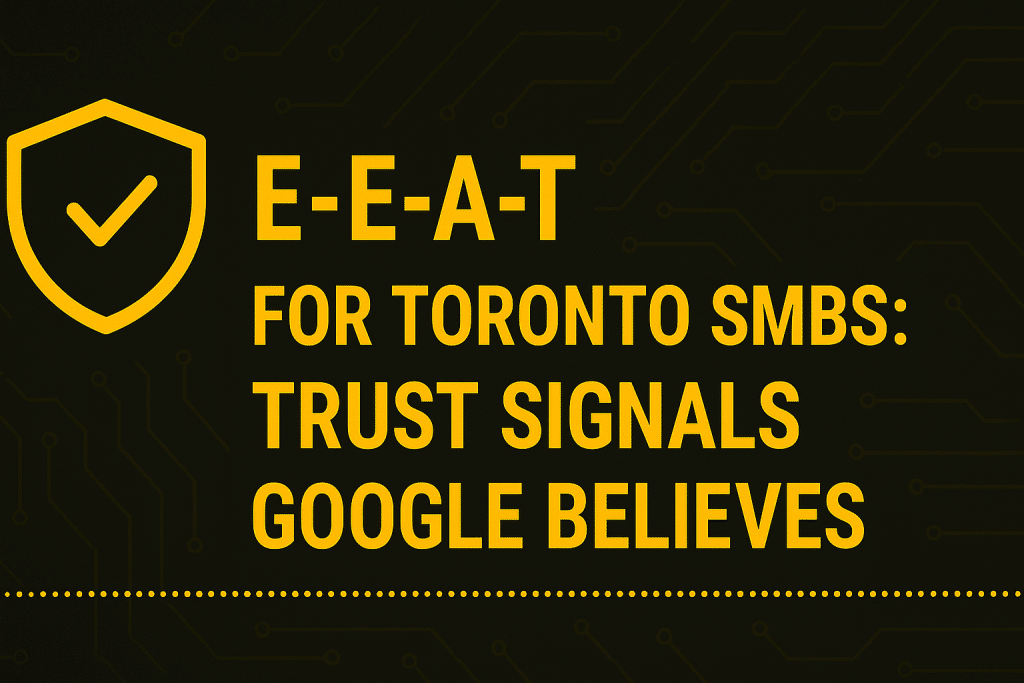In Toronto’s highly competitive digital landscape, small and medium-sized businesses (SMBs) can no longer rely on keyword stuffing or surface-level optimization to rank. Google’s evolving algorithms place tremendous weight on E-E-A-T (Experience, Expertise, Authoritativeness, and Trustworthiness) — and businesses that can demonstrate real trust signals are the ones that consistently dominate local search.
For Toronto SMBs, applying E-E-A-T isn’t just about “good content.” It’s about building a credible digital presence that Google treats like a legitimate authority, whether you’re a law firm in Bay Street, a café in the Distillery District, or a SaaS startup in Liberty Village.
Understanding E-E-A-T and Why It Matters for Toronto SMBs
E-E-A-T is Google’s framework for evaluating the quality and reliability of online content. Initially known as E-A-T, “Experience” was added in 2022 to strengthen Google’s focus on real-world expertise and first-hand knowledge.
For Toronto businesses, this means your website and digital footprint must convincingly demonstrate:
Experience: Showing first-hand insights, case studies, and real-world results.
Expertise: Demonstrating subject-matter knowledge through in-depth, accurate content.
Authoritativeness: Earning recognition from other reputable sources, both locally and industry-wide.
Trustworthiness: Building a secure, transparent, and reliable online environment for users.
Unlike paid ads, E-E-A-T cannot be “bought.” It’s earned over time through strategic branding, consistent content quality, and reputation signals Google’s algorithms can measure.
The Rise of Trust as a Ranking Factor in Google’s AI-Driven Search
With Google Search Generative Experience (SGE) and AI-driven ranking signals becoming mainstream, trust indicators now play a pivotal role. Websites that lack credible sources, author bios, and brand consistency are being sidelined.
Recent Toronto case studies have shown that businesses focusing on entity-based SEO and E-E-A-T have seen substantial gains in organic visibility. For example, companies that combine local SEO tactics with robust author pages and structured data often secure top spots in Google’s AI overviews — even outranking larger competitors.
1. Experience: Proving Real-World Knowledge Through Content
Publish First-Hand Case Studies and Success Stories
Google rewards content created by people who have directly experienced the topic. Toronto SMBs should leverage their operational history to build trust:
Showcase client success stories, before-and-after results, or local service transformations.
Use real locations (e.g., “SEO campaign results for a Toronto HVAC company in North York”) to boost local relevancy.
Include verifiable data such as timelines, revenue uplift, or lead volumes.
For example, a marketing agency can mirror the strategic transparency seen in this 90-day organic growth case study to illustrate proven results.
Use Authentic Imagery and Media
Stock photos erode trust. Real project images, office shots, team videos, and behind-the-scenes clips signal authenticity to both users and algorithms. Pair these visuals with descriptive alt text and geotagging for additional local SEO impact.

2. Expertise: Building Author Profiles and Topical Authority
Author Bios with Credentials
Every blog post, service page, and resource should have a clearly identified author with credentials relevant to the subject.
For example, if a Toronto law firm writes about immigration, the post should be authored by a licensed lawyer with a short bio, a LinkedIn profile link, and credentials such as “LL.B. Osgoode Hall Law School.” Google’s quality raters evaluate such signals closely, especially for YMYL (Your Money or Your Life) content, which includes legal, medical, and financial information.
Topical Clustering and Depth
Expertise isn’t proven through one-off blog posts. It’s established by covering entire topical clusters comprehensively. For example, if your Toronto SEO agency writes about “AI in SEO,” don’t stop at one article. Create a series covering tools, case studies, ethics, and future trends. Agencies using clustering strategies — as explained in this AI keyword clustering guide — are leading the SERPs.
3. Authoritativeness: Earning Recognition from Reputable Sources
High-Authority Backlinks and Mentions
Authoritativeness comes from what others say about you, not just what you say about yourself. For Toronto SMBs, this can mean:
Getting cited by local chambers of commerce, city directories, or industry associations.
Being referenced in reputable media like CBC, The Globe and Mail, or Government of Canada business directories.
Earning links from trusted industry resources, academic institutions, or recognized thought leaders.
Backlinks built through PR, partnerships, and digital outreach carry more weight than generic guest posts. The best Toronto agencies focus on link quality over quantity, a strategy explored in this deep dive on link building tactics.
Leverage Third-Party Reviews and Awards
Google scans external platforms like Google Business Profile, Yelp, Trustpilot, and Clutch for signals of public recognition.
For Toronto SMBs:
Accumulate consistent, high-quality reviews across platforms.
Highlight any local awards (e.g., “Toronto’s Top 10 Startups”) on your site using structured data markup.
Embed trust badges only if they are verifiable and from legitimate sources.
4. Trustworthiness: Securing User Confidence at Every Touchpoint
Site Security, Policies, and Transparency
Basic trust factors like HTTPS, visible contact information, privacy policies, and terms of service are non-negotiable. Google’s algorithms are particularly sensitive to sites that collect user data without transparency.
Toronto SMBs handling sensitive information — such as law firms or financial advisors — should link to government standards like the Office of the Privacy Commissioner of Canada to reinforce regulatory compliance.
Clear Contact and Ownership Information
Trust is reinforced when users can easily identify who operates the business. Include:
A physical Toronto address.
Team or founder profiles.
A well-structured contact page with multiple ways to reach your business.
Anonymous or vague sites rarely rank well in competitive niches.
Integrating E-E-A-T with Local SEO for Maximum Impact
Toronto’s local search landscape is fierce. To stand out, E-E-A-T must align with Google’s local ranking factors:
Citations & NAP Consistency: Ensure your Name, Address, and Phone Number match across directories, your Google Business Profile, and your website.
Entity Optimization: Strengthen your brand entity through structured data, schema markup, and interlinking related content.
Content Localization: Include Toronto neighborhoods, landmarks, and local case studies to reinforce geographic relevance.
Businesses that strategically combine E-E-A-T with localized content clusters — like those seen in Toronto SEO strategy guides — consistently outperform generic sites.
5 Practical Steps Toronto SMBs Can Take Right Now
Audit Existing Content for E-E-A-T Gaps
Review your top pages and blogs. Check for missing author bios, vague claims, outdated information, or lack of citations.Update Author and Company Pages
Add credentials, media mentions, structured data, and clear ownership signals.Develop Topical Clusters with Depth
Build interconnected articles targeting specific Toronto industries or niches, supported by internal linking and rich media.Pursue High-Authority Local Mentions
Engage with local organizations, sponsorships, or community events to earn reputable mentions.Embed Transparent Policies and Contact Information
Make trust signals visible on every major page — especially service and lead generation pages.
E-E-A-T is a Long-Term Investment, Not a Shortcut
Toronto SMBs that treat E-E-A-T as a strategic business asset rather than a checkbox are the ones dominating SERPs, especially as Google leans further into AI-based search.
By combining real-world experience, credible authorship, external validation, and transparent trust practices, your business can build an online reputation that not only satisfies Google but also converts more local customers.


